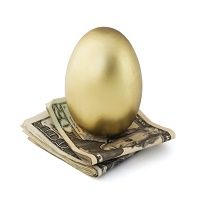Financial Freedom: How I Reached Financial Independence By 40
Though dentists and other healthcare professionals face significant financial challenges, careful planning can enable any dentist to become financially free.

Earlier, I wrote about the benefits of financial independence (FI), and declared myself to be financially independent, but I haven't shared the details about how it all happened. That's what I'd like to do today.
I could go back, way back to 1st grade, when I dominated the Iowa Basics. Or the glorious junior high days, when I was a star mathlete. Sadly, that’s not a typo. But what matters is that I did well in school and rocked some standardized tests. I thought I was kind of a big deal. As a senior in high school, I received numerous scholarships, but there was one in particular that led to my first step towards eventual FI.
Choosing a college was no easy task. I had the Princeton Review guide, a few campus tours, the US News rankings, and no idea what was really important. The fact that Vanderbilt had an on-campus Taco Bell and you could use your meal plan card there carried way, way more weight than it should have. But I thought that was pretty outstanding. Plus, they offered me a merit scholarship covering 75% of tuition.
I was admitted to some other top schools too, like Duke, Yale, and Stanford. I hadn’t actually seen any of them, and they probably didn’t have on-campus Taco Bells, but I thought I might like to go to a Big Name school. I also got into my safety school, the good old land-grant State U, but I hadn’t given it that much consideration. Until the phone call. The call where they offered me full tuition for four years. Sentence fragments. I know. Maybe I should’ve gone to Yale.
Instead, I followed in the footsteps of my mother and father and his father and went to State U. I graduated in four years, enjoying it so much I decided to stay for four more, finally leaving in 2002 with an MD. I consider my choice of college and medical school to be an important first step towards FI.
Between the scholarships, the in-state public school tuition, and a college fund set up by my grandparents, I was able to finish undergrad with money in the bank. I took out loans during medical school, lived in shabby apartments next to campus, and was able to graduate with a hefty five-figure debt. If I hadn’t had my grandparents’ help, or had gone to private school at any point, my debt would have easily been six-figures.
My parents didn’t help pay for college; tuition, fees, room and board were already covered. They did help me financially, though. My dad taught me the Rule of 72 when I was a kid. When I got a job in high school, they helped me open an IRA, and helped me fund it when the $4.25 an hour I earned at the grocery store wasn’t enough. They also covered the taxes for a Roth conversion (but not this Roth conversion) when I was in a low tax bracket.
The financial help was great, but I probably benefitted as much or more from the financial education aspect. Why are we opening an IRA? What is a Roth conversion, and why should we do this now? How much might account this be worth 40 years from now if it were to grow 9% per year? Answer: 32 times as much, thank you Rule of 72 and compound interest!
I was able to save enough during my internship for a 10% down payment on a one-bedroom condo in residency. I became a homeowner, had a nice place to live, and the place appreciated in value. Hindsight being 20/20, it would have been wise to sell when I graduated in 2006, but we weren’t ready. I say we because I became engaged in 2006 as well. I bought my lovely girlfriend a ring with about two weeks’ worth of a resident’s salary. To this day, she still complains that the diamond is too big. It turns out I fell in love with someone who despises wasting money even more than I do, my second big step towards FI.
You may have heard the term “live like a resident.” It’s a mindset that helps many doctors and other healthcare professionals control their spending. It’s also advantageous to work like a resident to really kickstart your savings. We traveled around, and I worked as locum tenens anesthesiologist for nearly two years. Our housing was paid for, I got a nice daily wage and per diem, and I took very little time off. If call was available, I worked it.
In two years spanning three calendar years (July to July) I had built up a sizable SEP-IRA, and had set enough cash aside to purchase a six-figure waterfront lot with cash after taking a “permanent” job. Once again, I thought I was kind of a big deal. The kind of big deal that needs to build a half-a-million dollar house on that waterfront lot.

After a few years of every-third-night call and
work on some vacations, we were in great shape. We had two little boys, each with their own bedroom and 529 fund. I had been contributing the max to the SEP-IRA and I started buying mutual funds in a taxable account. I was paying down the mortgage aggressively. Life was great! Until the hospital went bankrupt!
I returned to doing locums, took another job that ended up being more like a long-term locums, then settled into my current (and very likely final) position early in 2014, at a place where I had been a locums doc seven years earlier.
We finally sold the one-bedroom condo from residency in the summer of 2014 for a small profit after having tenants renting for seven years. In the fall of 2015, we sold the big waterfront house, for more than $200,000 less than we had into it. Yeah, that stung. But ripping off that humungous band-aid made us debt-free and more importantly, financially independent.
We once again have a waterfront home on the bluffs overlooking the river. We spent a lot less money on this home but it suits us very well. Having become somewhat debt averse and already paying two mortgages at the time we moved here, we decided to sell some funds from the taxable account and buy the home with cash, keeping my goal of being debt-free at 40 a reality.
What did I do right along the way on my path to FI? I worked hard and I saved. I did spend and lose a lot on a home, but we didn’t overspend on furniture, cars, or other big-ticket items. We’ve taken some awesome vacations, but our day-to-day living is relatively frugal. I didn’t hire a money guy/insurance salesman. I educated myself in personal finance.
I got by With A Little Help From My Friends (I prefer the Joe Cocker version, having grown up watching the The Wonder Years). Not everyone can rely on family for financial help during school. Some rough back-of-the-envelope math tells me I would have had to work an extra four to six months to achieve FI if I hadn’t had financial help from my parents and grandparents. I say this not to minimize what they did for me (it was huge at the time), but to dispel any notion that a silver spoon in your mouth is necessary to achieve FI at an early age.
I’ve benefitted from the behavior of the markets since I finished my residency in July of 2006 to where we currently stand at the end 2016. We withstood an early substantial drop, followed by a sustained bear market.
By buying on the way down and the way back up, I was able to buy more shares for my money. There have been a few short-lived corrections, but we’re in the midst of the third-longest bull market in modern history. If you are relatively young, don’t be discouraged by big drops. As long you keep investing, and the market eventually recovers, you may eventulaly be better off than if it had never dropped at all.
My investments haven’t been speculative or fancy. I didn’t have an awesome 20-step guide to DIY investing. I initially invested with T. Rowe Price but have transitioned all of my investments to Vanguard index funds (see my portfolio here). The fees are quite low and the funds are tax efficient. The only oddball investment in the mix is a small ownership share in a local craft brewery. It represents less than 2% of my portfolio and pays dividends in beer, so I’m more than comfortable hanging onto that one.

Today, I’ve got more than 25 years worth of expenses in the nest egg, a number that qualifies me as financially independent. I’m not interested in retiring at the relatively youthful age of 40, and I plan on continuing to build the nest egg for at least another five years. I hope you'll continue to follow me and read along as I continue this journey.
ACTIVA BioACTIVE Bulk Flow Marks Pulpdent’s First Major Product Release in 4 Years
December 12th 2024Next-generation bulk-fill dental restorative raises the standard of care for bulk-fill procedures by providing natural remineralization support, while also overcoming current bulk-fill limitations.